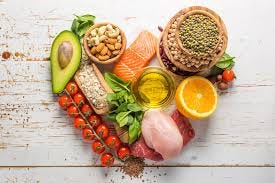The Wellness Edit: Your Gut is Talking—Are You Listening?
Why Your Gut Holds the Key to Energy, Mood, and Immunity
Hello, I’m Jenn, and if you’re new here, welcome to Naturally Healing. In this space I explore mindful slow living for wellbeing, the power of nature to help us heal, and the importance of showing up as our authentic selves. Here, you’ll find honest reflections, personal stories, and a reminder to prioritise what truly matters—our health, our peace, and the way we live each day. I post twice a week: Tuesday is all about Authenticity Unfiltered, where we dive into honest, real conversations about living authentically, embracing imperfections, and showing up as our true selves. Fridays are our Wellness Edit, where we explore all things related to healing and wellness, with a special focus on the power of nature. Thanks for reading 🤎
We often think of digestion as a simple, mechanical process—food goes in, energy comes out. But our gut is so much more than a glorified food processor. It’s a central player in how we feel, function, and even think. From immunity to mood regulation, from skin health to hormonal balance, the gut quietly governs an astonishing amount of our overall wellbeing.
I like to think of the gut as our body’s quiet communicator. It doesn’t shout. It whispers. A gentle bloating after lunch. A sudden shift in energy levels. A skin flare-up that appears without warning. These aren’t random nuisances; they’re signals. Your gut is talking to you.
The question is—are you listening?
The Forgotten Intelligence of the Gut
Science now refers to the gut as the "second brain" for a reason. It’s home to over 100 million neurons and communicates directly with the brain through the gut-brain axis. That fluttering feeling before a big event? The sick-to-your-stomach sensation after stressful news? That’s your gut reacting. In fact, around 90% of serotonin (a key mood-regulating hormone) is produced in the gut.
If your gut is imbalanced—think poor digestion, inflammation, or dysbiosis (an imbalance of bacteria)—you may also feel it emotionally: through anxiety, low mood, brain fog, or poor sleep. And yet, this connection is often overlooked in conventional medicine.
Signs Your Gut Might Be Struggling
Gut dysfunction can look different for everyone, but here are some common red flags to keep an eye on:
Bloating, gas, or irregular bowel movements
Persistent fatigue, especially after eating
Frequent illness or low immunity
Skin conditions like acne, eczema, or rosacea
Brain fog or mood swings
Cravings for sugar or highly processed foods
These aren’t just superficial annoyances—they're clues that something deeper may be going on. The good news? Your gut wants to heal. And healing often begins with small, consistent changes.
How to Start Listening (and Supporting Your Gut)
You don’t need a total life overhaul to start healing your gut. What matters most is consistency, curiosity, and compassion for your body.
Here are some simple, gentle steps you can take:
1. Chew Your Food (Really Chew It)
Digestion starts in the mouth. By chewing thoroughly, you activate digestive enzymes and ease the workload on your stomach and intestines. Aim to chew each bite at least 20-30 times. It might sound excessive, but your gut will thank you.
2. Crowd In, Don’t Cut Out
Instead of focusing on restriction, think about adding in gut-loving foods:
Fermented foods like sauerkraut, kefir, kimchi, and natural yogurt
Prebiotic-rich foods like garlic, onions, leeks, asparagus, and bananas
Fibre from a variety of fruits, vegetables, nuts, seeds, and legumes
3. Hydrate Throughout the Day
Dehydration slows digestion and can contribute to constipation. Sip water throughout the day rather than gulping it down all at once. Herbal teas like peppermint, fennel, or ginger can also support gut comfort.
4. Reduce Stress Where You Can
Your nervous system plays a huge role in digestion. Chronic stress can slow it down or shut it off completely. This is why things like mindfulness, breathwork, journaling, walking in nature, or simply slowing down your meals can make such a big difference.
5. Eat Without Distraction
When you eat in front of your phone or TV, your body remains in a heightened, distracted state. This limits the rest-and-digest response. Try to eat in a calm environment. Focus on your food. Notice the flavours, the texture, and how your body responds.
6. Keep a Gentle Food & Mood Journal
If you suspect food is impacting your gut or mood, try keeping a simple journal. Note what you ate, how you felt physically and emotionally afterward. Patterns will emerge. Use this not to restrict, but to get curious about what your body is telling you.
Remember: Healing is Not Linear
There’s no one-size-fits-all approach to gut health. Some days, your body might feel amazing. Other days, you may bloat after a salad and wonder what went wrong. This doesn’t mean you’re failing. Healing is not a straight line. It’s a spiral—sometimes you return to familiar discomforts, but each time you do, you’re coming back with more awareness.
What matters is that you continue to tune in, trust your instincts, and give your body what it needs with kindness.
And remember…
In a world that often asks us to push through discomfort, the act of pausing and listening to your gut is revolutionary. It's a way of saying: I’m here, I’m paying attention, and I want to feel well.
You don’t have to overhaul your life to support your gut. Start small. Tune in. And remember that every little shift—every glass of water, every extra chew, every mindful meal—is a quiet vote for your long-term health.
Your gut is talking. Let it be heard.
Thank you for reading.
Take care,
Jenn x





This really helpful Jennifer - thank you!